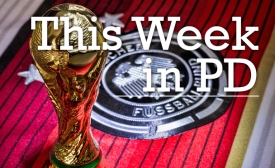soft power
NEW DELHI: Prime Minister Narendra Modi will not perform yoga at the mega event on Rajpath to mark the 'International Yoga Day' on June 21, External Affairs Minister Sushma Swaraj said on Tuesday. Ms Swaraj, who was briefing the reporters on the arrangements to mark the Day, said "he (Modi) will grace the occasion and address the gathering but he will not perform yoga."
David Concar was in Malta visiting and viewing preparations for the upcoming CHOGM, mentioning that the Queen’s presence at the Heads of Government meeting emphasizes the importance of this CHOGM session.
The FBI agents who broke the International Football Federation scandal in late May by getting a bunch of foreigners arrested in Switzerland are naturally convinced that their sole purpose is to combat corruption. American ideologues who advocate “R2P” – the “right and responsibility to protect” – have no doubt that U.S. armed intervention is a suitable way to protect human rights. Air Force officers who bomb people in Afghanistan, Pakistan or Yemen take it for granted that they are eliminating terrorism.
It is widely believed that although China’s hard power has increased tremendously in the last three decades, China’s soft power is still very limited. To some degree this is true. Very few big ideas come from Chinese thinkers; even the term ‘soft power’ itself is an American invention. Chinese leaders are well aware of this situation, and this is partly why the Chinese government in recent years has tried to promote China’s soft power through institutions like the Confucius Institutes and so on.
All over the world, the middle classes take temporary leave of their senses when they bear their first child — and especially when junior is ready to start school. We all know about China’s Tiger Mums, but as far as I can see, other countries have ferocious felines too. Chinese mums are not the only ones loading their tiny ones up with after-school classes, to make sure they do well in college entrance exams (China’s own version of this — the dreaded gaokao — finishes on June 9).
When the International Indian Film Academy awards, Bollywood's annual global extravaganza, opened in Kuala Lumpur yesterday, actor Anil Kapoor, filmmakers Ramesh Sippy and Rakeysh Omprakash Mehra and industry honchos shared the stage with an unlikely co-speaker - India's number two diplomat. Anil Wadhwa, secretary (east) in the ministry of external affairs, is in charge of India's relations with almost half the world, from Palestine to the Philippines and Syria to South Korea.
here is no question that there is a lot of corruption inside the Fédération Internationale de Football Association (FIFA). Bribes and behind the scene deals have been going on for decades. The sport federation is responsible for the most watched and popular sport in the world and is part of a lucrative business venture that has a lot of soft power and prestige attached to it.

PD News highlights the power and limitations of Soccer Diplomacy.







